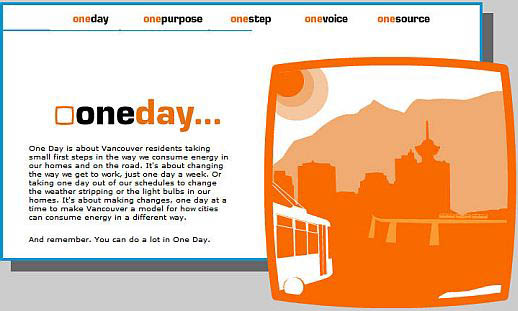 |
Whether it’s for personal fitness, to be part of the solution for future generations, or to help Vancouver become recognized as a world model for how an urban centre can manage energy consumption, the folks at onedayvancouver.ca are there to help you find ways to take that first step.
For instance, in your home you can …
- Install compact fluorescent light bulbs
- Install low-flow showerheads
- Set back your thermostat at night
- Look for the EnergyStar label when purchasing new appliances
- Take advantage of BC Hydro Power Smart programmes and incentives
- Turn the lights out when you leave the room
On the road, you can cut down on your energy consumption by …
- Leaving your car at home, just one day a week
- Walking or cycling to work or school
- Taking transit
- Joining a car co-op
Cities are for people (not cars). John Naisbitt (author of High Tech/High Touch: Technology and Our Search for Meaning) had it right: the more technology distances us (telecommuting, distance education, e-mail, videoconferencing), the more we crave human contact. Today, walkable communities, stroll districts, green transit, multi-modal transportation, urban density … all point in the direction of people-centered planning.
Cities are for all people. For cities of the future, tolerance is passé; inclusion is critical. Young people are moving to cities where people ‘mix’: in clubs, at church, and in neighbourhoods. In Paris, housing projects require a set-aside of several units only for artists. Other cities (such as Vancouver) require that 10 to 15 perecent of all new residential buildings are affordable housing. When integration occurs, it can be transformative and magical.
Healthy cities are important, too: cities that are committed to diesel-hydrogen transit buses, more bike racks on the front of buses, more walking and biking trails within cities (not just outside them) and greater commitment to green / open spaces contribute to sustainability.
Much of our future, and our children’s future, depends on making our cities ‘sustainable’. The time is here to enable even greater access to community services and recreation; to enhance our social prosperity; to minimize our need to travel across broad stretches of the Lower Mainland in our daily commute, and to build sustainable and affordable mass transit for all; to ensure safety within our communities; to provide a clear city centre focus in each of our communities; and to protect and preserve the key features of our city environment — our historic buildings, nature conservation, and the parks, beaches and woods of our city’s natural landscape.